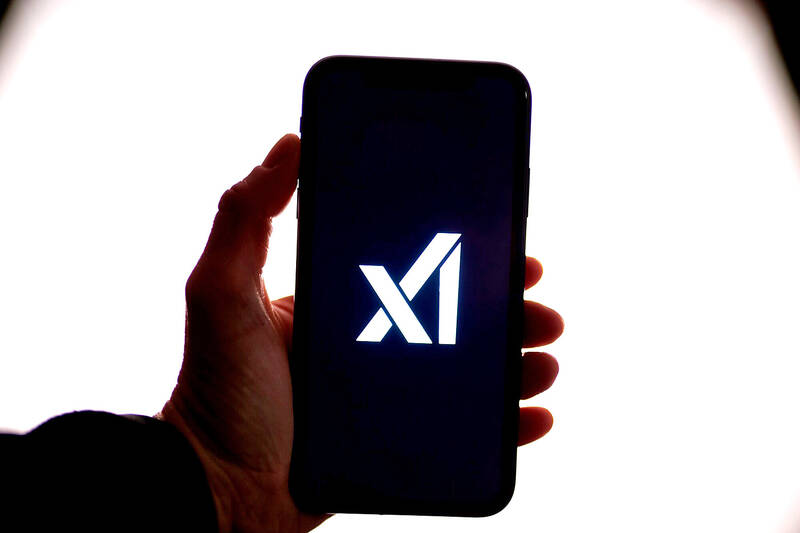Billionaire tech mogul Elon Musk has told investors he plans to build a supercomputer dubbed “gigafactory of compute” to support the development of his artificial intelligence (AI) start-up xAI, an industry news outlet reported on Saturday.
The Tesla Inc CEO wants the supercomputer — which would string together 100,000 Nvidia H100 graphics processing units (GPU) — to be operational by fall next year, and he “will hold himself personally responsible for delivering it on time,” The Information said.
Nvidia’s H100 family of powerful GPUs dominate the data center chip market for AI, but can be hard to obtain due to high demand.

Photo: Bloomberg
The planned supercomputer would be “at least four times the size of the biggest GPU clusters that exist today,” such as those used by Meta Platforms Inc to train its AI models, Musk was quoted as saying during a presentation to investors this month.
Since OpenAI’s generative AI tool ChatGPT exploded on the scene in 2022, the technology has been an area of fierce competition between tech giants Microsoft Corp and Google Inc, as well as Meta and start-ups like Anthropic and Stability AI Inc.
Musk is one of the world’s few investors with deep enough pockets to compete with OpenAI, Google or Meta on AI.
His company xAI is developing a chatbot named Grok, which can access social media platform X, also owned by Musk, in real time.
Earlier this year, Musk said training the Grok 2 model took about 20,000 Nvidia H100 GPUs, adding that the Grok 3 model and beyond would require 100,000 Nvidia H100 units.
In related news, Tesla shareholders are being urged by a major proxy advisory firm to reject a proposed US$56 billion pay package for Musk, in a blow to the electric-vehicle manufacturer’s board.
Glass Lewis & Co made its recommendation in a report released on Saturday, citing the “excessive size” of the pay deal and the dilutive effect upon exercise.
“Mr. Musk’s slate of extraordinarily time-consuming projects unrelated to the company was well-documented before the 2018 grant, and only expanded with his high-profile purchase of the company now known as X,” Glass Lewis said.
The recommendation to large institutional investors might sway their vote over Musk’s pay at the vehicle manufacturer’s annual meeting on June 13. If the proposal is rejected, the CEO might make good on threats to develop products outside of Tesla.
Next month’s vote would be the second time Musk’s pay package has been put before shareholders. The remuneration deal was originally crafted in 2018, but earlier this year a Delaware judge voided it, saying investors were not fully informed of key details.
If Tesla’s board can show the compensation deal still has broad support, it might help with a legal appeal of the ruling. On the other hand, a loss would be a major embarrassment and demonstrate that investors are losing faith in Musk’s leadership. The vote is only advisory, meaning Tesla can choose to ignore it.
Additional reporting by Bloomberg

In Italy’s storied gold-making hubs, jewelers are reworking their designs to trim gold content as they race to blunt the effect of record prices and appeal to shoppers watching their budgets. Gold prices hit a record high on Thursday, surging near US$5,600 an ounce, more than double a year ago as geopolitical concerns and jitters over trade pushed investors toward the safe-haven asset. The rally is putting undue pressure on small artisans as they face mounting demands from customers, including international brands, to produce cheaper items, from signature pieces to wedding rings, according to interviews with four independent jewelers in Italy’s main

Japanese Prime Minister Sanae Takaichi has talked up the benefits of a weaker yen in a campaign speech, adopting a tone at odds with her finance ministry, which has refused to rule out any options to counter excessive foreign exchange volatility. Takaichi later softened her stance, saying she did not have a preference for the yen’s direction. “People say the weak yen is bad right now, but for export industries, it’s a major opportunity,” Takaichi said on Saturday at a rally for Liberal Democratic Party candidate Daishiro Yamagiwa in Kanagawa Prefecture ahead of a snap election on Sunday. “Whether it’s selling food or

CONCERNS: Tech companies investing in AI businesses that purchase their products have raised questions among investors that they are artificially propping up demand Nvidia Corp chief executive officer Jensen Huang (黃仁勳) on Saturday said that the company would be participating in OpenAI’s latest funding round, describing it as potentially “the largest investment we’ve ever made.” “We will invest a great deal of money,” Huang told reporters while visiting Taipei. “I believe in OpenAI. The work that they do is incredible. They’re one of the most consequential companies of our time.” Huang did not say exactly how much Nvidia might contribute, but described the investment as “huge.” “Let Sam announce how much he’s going to raise — it’s for him to decide,” Huang said, referring to OpenAI

The global server market is expected to grow 12.8 percent annually this year, with artificial intelligence (AI) servers projected to account for 16.5 percent, driven by continued investment in AI infrastructure by major cloud service providers (CSPs), market researcher TrendForce Corp (集邦科技) said yesterday. Global AI server shipments this year are expected to increase 28 percent year-on-year to more than 2.7 million units, driven by sustained demand from CSPs and government sovereign cloud projects, TrendForce analyst Frank Kung (龔明德) told the Taipei Times. Demand for GPU-based AI servers, including Nvidia Corp’s GB and Vera Rubin rack systems, is expected to remain high,